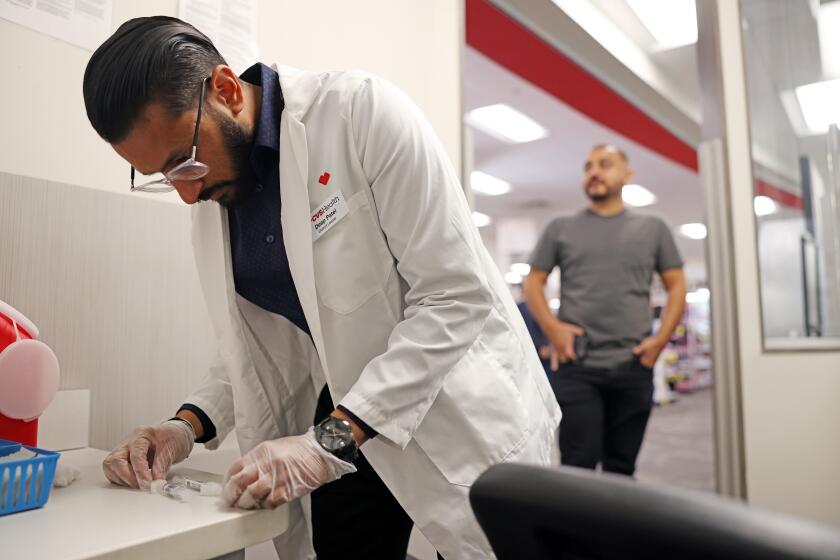Dentists debate need to extract wisdom teeth
The decision to remove wisdom teeth often seems like a routine part of young adulthood. But more people are starting to ask whether it’s always necessary.
Those who oppose automatically taking out those four teeth say “watchful waiting” is a better path because the teeth and surrounding gum tissue might remain normal, making costly surgery unnecessary.
The four teeth at the very back of the jaw, also called the third molars, generally start to shift at 17 to 25 years of age, according to the American Assn. of Oral Maxillofacial Surgeons. When wisdom teeth break through the gum only partly, often because there’s not enough room in the jaw, they are considered impacted. That can lead to decay, plaque and other problems, and that’s why many dentists suggest removing them despite no apparent diseases in the teeth.
Plus, discomfort from the removal generally increases with age.
But there’s disagreement about whether wisdom teeth need to come out to ease crowding — not so long ago a common reason for extraction. A 2012 Cochrane review of randomized clinical trials related to wisdom teeth looked at evidence on both sides of the debate. In its conclusion, the research team found no sufficient data to suggest that taking out wisdom teeth reduced crowding of the remaining teeth over five years.
Americans spend an estimated $3 billion a year removing wisdom teeth, according to the American Public Health Assn. And the single biggest predictor of having the surgery is “availability of insurance,” according to respondents in an APHA survey published in April. “When dentists recommended removal, 55% of participants adhered to this recommendation during follow-up, and the main reason was availability of insurance (88%),” according to the survey.
To extract a single wisdom tooth, depending on procedure complexity, tooth position and where you live in the country, insured people might pay from $300 to $600 on average per tooth, says Jay Friedman, a general dentist and consultant in Los Angeles who analyzed a survey of fees in 2013 from the American Dental Assn.
“A person with good dental insurance might have to pay 20% of the fee out-of-pocket, as much as $320 to $500 for four wisdom tooth extractions,” Friedman added.
Just how many healthy wisdom teeth are routinely removed remains unclear. Dental procedures are not held to the same international tracking standards that yield statistical data on other medical professions, says Dr. John Yamamoto of Delta Dental of California, the largest dental benefits carrier in the state. But he says that based on Delta Dental claims data from the first quarter of 2014, nearly 80% of the extractions performed by oral surgeons were of wisdom teeth.
Other procedures performed by oral surgeons include dental implants, corrective jaw surgery and facial surgery for cleft lip and palate.
The risks
Risk is part of any surgery, even the most routine.
When weighing the risks of wisdom tooth extraction, ask yourself: “What’s the relative benefit?” says Richard Niederman, chairman of the department of epidemiology and health promotion and director of the Center for Evidence-Based Dentistry at New York University.
“If the tooth is not diseased, leave it in. If it is diseased, then consider taking it out,” says Niederman. He urges patients and dentists to focus on the current state of health and avoid predictions that may or may not prove true.
Anesthetics
Most wisdom teeth extractions could be done with a local anesthetic, in which the patient is awake and able to communicate with their dentist, says Friedman, a vocal critic of routine wisdom teeth removal and of routinely turning that job over to oral surgeons, who can administer general anesthetics. A general anesthetic, which makes the patient unconscious, he says, is used too often and costs more.
“They [oral surgeons] like to give general anesthetic. It’s a big money maker. You’re making a lot of money giving general anesthesia or I-V sedation, even though you don’t need it,” says Friedman, adding that he has often removed wisdom teeth with a local anesthetic, such as Novocain.
Friedman also said surgeons prefer general anesthetic because it’s easier for them to work in the mouth. One risk, he says, is that the jaw can be opened too wide, causing injury.
And in rare cases, nerve injury leaves people with permanent lip, tongue and cheek numbness after removing wisdom teeth, according to the American Public Health Assn.
Keeping teeth
But there also are risks to keeping wisdom teeth, including gum infections or the potential for emergency surgery, says Dr. Thomas Dodson, a professor in oral and maxillofacial surgery at the University of Washington. Recent studies have shown that third molars can be unpredictable, he says.
About 60% of his patients choose to have their wisdom teeth removed, he says.
For those who keep their teeth, close monitoring by dentists and careful care by their owners are required.
Scott Tomar, a professor of community dentistry and behavioral science at the University of Florida, considers removing healthy wisdom teeth no different than removing a healthy appendix just in case it might burst. “I don’t know of any other surgical treatment still done in the United States where we prophylactically do an invasive surgical procedure unless there’s pretty strong evidence supporting it. We’ve abandoned that idea long ago.”
::
The theory behind wisdom teeth
Why did humans develop wisdom teeth — apparently called that because they emerge after we’ve accumulated a bit of wisdom?
Scientists theorize that early humans once put their wisdom teeth to good use. That’s because the human diet was largely roots, tough meats and raw food. Think jerky — morning, noon and night. With these hard-to-eat foods, it meant the human jaw worked much harder to grind up a meal before swallowing. The extra teeth helped get the job done. According to scientists, at one time the jaw was larger, something that gave ample room for these often-misunderstood molars to thrive.



